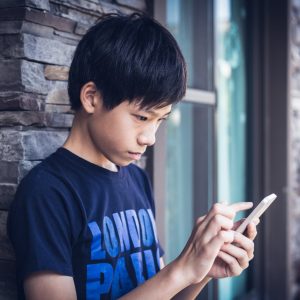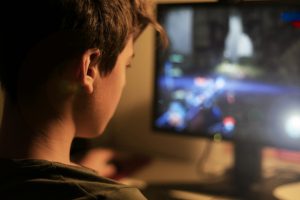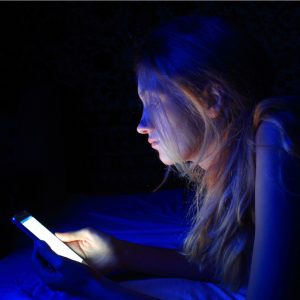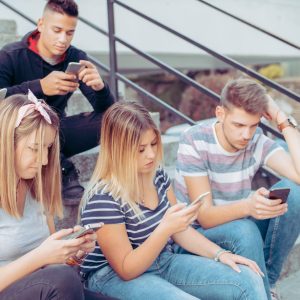
It was 7:30AM as I drove through the bitter cold winter wind. Despite the heat blowing from my car vents the atmosphere inside felt bitter cold as well. My son sat stiffly beside me, arms crossed angrily across his 12-year old chest and glared out at the frosty landscape. I knew he was probably reflecting the anger I had thrown his way the evening before. Not a good way to end the day, not a good way to start a new one…and I was remorseful.
“I’m really sorry I lost my temper with you last night, buddy. Our rules about unplugging from social media and screens are there to help you, not hurt you. You chose to disregard those rules, and so being grounded from your phone and computer this week still stands…even though I wish I hadn’t been so harsh.”
Silence reigned in the car for almost a full five minutes. I glanced at him expectantly several times, till he finally grumped out, “whatever.”

Despite some pretty strict household rules about online media use, I had the sneaking suspicion my 7th grade son was plugged in far more than he ought to be. In summers past he and his brothers were outside most of the day, riding bikes, jumping on the trampoline, hiking in the woods. But since starting middle school he seemed far more inclined to sit in front of the computer. Unfortunately, research confirmed my worries: kids are clearly spending far less time outdoors than online. A recent article in Environment and Behavior described research on middle schoolers in rural South Carolina and the “growing evidence highlighting the negative influence of escalating screen time on outdoor time and connection to nature during adolescence.”
I thought carefully about how to communicate, how to reach into his heart and help him see my love and concern, and not simply the sting of a consequence. “Do you remember how irritable and cranky you were this summer? How you talked about being lonely? Then how frustrated and angry you were once school started, even being with friends every day? And on our trips to the lake, it’s like you couldn’t find joy in anything. What’s going on, son? I love you so much, and I just don’t know how to help.”

My observations were sadly concurrent with increasing psychological and medical evidence that more social media results in more social isolation and unhappiness. The American Journal of Preventative Medicine published a study of 1,787 young adults in the U.S.; research revealed a strong correlation between increased social media use and increased perceived social isolation. This illusory dichotomy is described by an EPJ Data Science research article as the happiness paradox. The authors explain, “results suggest that social media use may be associated with increased levels of social dissatisfaction and unhappiness if individuals are subject to unfavorable comparison between their own happiness and popularity to those of their friends.”
Back in the car, my son clenched his jaw and I could see tears begin to well up in his deep brown eyes. “Well you hardly ever let me be online! I just wanted to have screen time, but even this summer we only got to be online when you were at work! It’s just…ugh! Never mind! You wouldn’t understand!” He paused, sucked in a shuddering breath, and said, “it’s like – that’s where my life is, okay? Online, y’know?”
I didn’t have to say a word. Though only twelve, my tall and lanky, dark-haired son has a wisdom much greater than his years. Another minute or two passed in silence, while he slumped forward, defeated by the conviction of his own words. “You know what it really is? But I don’t wanna say it? ‘Cause if I say it you’re gonna…well, you’ll just…oh, it’ll just make it even worse!”
“What if I promise to just listen, to hear you and try to understand, without any reaction? Could you trust me enough to share what’s hurting you so much?”
Something finally broke through his angry façade, and a silent tear rolled down his still-boyish cheek. “Oh Mommy! I just hate that I want to be online all the time, that I think about it so much, like it’s the only fun thing in my life. I just wish….” Heartbreak and helplessness cracked through his voice, “I just wish it had never been invented! I wish screens and video games and social media didn’t even exist!”
Oh, my thoughtful, intelligent, tenderhearted boy. In so many ways, how I wish it too!

Unfortunately, we can’t go back in time. While most of us dearly appreciate the convenience and accessibility of smart phones, tablets, and laptops, we also recognize the way these devices have negatively impacted our culture in many ways. Once again, I turned to current research on ways to mitigate these harmful effects. In a fascinating article published in the Journal of Social and Clinical Psychology, scientists describe experimental research to evaluate the connection between social media use and overall contentment. They recruited 143 college-age students for a three-week study, randomly assigned to either use social media as usual (control group), or limit use to 30 minutes per day (experimental group). Unsurprisingly the group with limited social media use reported marked decreases in depression and loneliness at the conclusion of the study.
I kept my promise to my son. I listened with compassion, I didn’t offer any knee-jerk responses about tossing the computers out and unplugging our internet until he was 37. (Not that I wasn’t tempted to!) Instead, I’ve printed out some research articles, and tried my best to present a balanced picture of the benefits and dangers of ever-increasing social media and online activities. While we can’t go back and erase the existence and addictive pull of screens, we can create a plan for balance and self-monitoring. I’m learning that my kids must see the reality of current research and recognize the negative impact of media use apart from parental rules. I’m learning that knowledge has more impact than nagging.
And of course, the conundrum is this: here I am online, researching, writing, sharing…and there you are online, researching, reading, and gleaning from the experiential wisdom presented. Thus the challenge ensues, to unplug, shut it down, and disconnect after half an hour online in order to reconnect with real life. Time for me to sign off; happiness, relationships, and well-being are at stake! To life!
Outdoor Time, Screen Time, and Connection to Nature: Troubling Trends Among Rural Youth?
Environment and Behavior
https://doi.org/10.1177/0013916518806686
Social Media Use and Perceived Social Isolation Among Young Adults in the U.S.
American Journal of Preventative Medicine
https://doi.org/10.1016/j.amepre.2017.01.010
The Happiness Paradox: Your Friends are Happier Than You
EPJ Data Science
https://doi.org/10.1140/epjds/s13688-017-0100-1
No More FOMO: Limiting Social Media Decreases Loneliness and Depression
Journal of Social and Clinical Psychology
https://doi.org/10.1521/jscp.2018.37.10.751
By Terissa Michele Miller, MS Psy
This article was originally published in Modern Brain Journal.
About the author:
Teri Miller is a mom of nine and child development researcher with a Masters of Science in Psychology. She is a Research Associate at Gibson Institute of Cognitive Research, co-host of the podcast Brainy Moms, and the Managing Editor at Modern Brain Journal.
